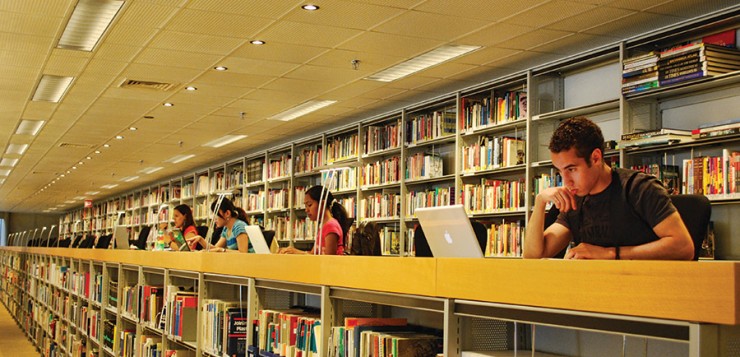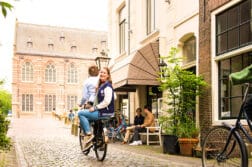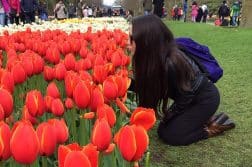Looking for an English-taught study programme at an excellent higher education institution in an international environment? Holland offers more than 2,100 English-taught programmes and courses in a broad range of fields. All programmes and courses lead to a bachelor’s, master’s or PhD degree, a diploma, or a certificate. Let Study in Holland be your starting point when looking for education programmes in the Netherlands.
About Holland
Holland is a small country that still manages to stand out for its great inventiveness, its problem-solving attitude, and its openness to the world. Studying in Holland offers you the space to be a pioneer, be creative, and get connected with over 700,000 Dutch and international students.
Pioneering
Holland has proven to be a true pioneering country in discovering inventive solutions to everyday problems. The way the Dutch created a large part of their country by reclaiming land from the sea shows their pragmatic approach to living below sea level. We can also see this approach when it comes to education. For a small country like Holland, an international outlook is a must in order to be a successful competitor in our increasingly internationalized world. Holland was the first non-English speaking country to offer courses taught in English.
Creative
The important role of the Dutch in the international design industry is a reflection of their creative drive. The creative sector in Holland is world famous for its innovative ideas and ground-breaking Dutch Design. It is perhaps because of the Dutch way of teaching that creativity has acclaimed such an important role in Dutch society. Students are challenged to solve problems with an out-of-the-box approach and work together in case studies to gather and share knowledge.
Connected
Holland is open to the world and to surrounding countries. We have to be! Cooperating with other countries is key to being successful for the Dutch. The strong connection between Dutch higher education institutions and the business world creates possibilities of practical assignments and internships to prepare students for a career in an international setting.
The Education System
Dutch higher education has a binary system, which means students can choose between two types of education: Research-oriented education, offered by research universities; and higher professional education, offered by universities of applied sciences. For both types, the teaching style can be described as interactive and student-centred, providing students with the attention and freedom they need to develop their own opinions and creativity in applying their newly-acquired knowledge. A large portion of all programmes is dedicated to writing papers, working in groups to analyse and solve specific problems, acquiring practical work experience through internships, and conducting experiments in laboratories. This interactive approach, as well as working in groups, ensures that you as an international student can become involved in the instructional process.
Research universities focus on the independent practice of research-oriented work in an academic or professional setting. Universities of applied sciences offer professional programmes in the applied arts and sciences that prepare students for specific careers.
Holland also has a number of institutes for international education, which offer advanced training courses originally designed for people from developing countries whose jobs require highly specialised knowledge.
The academic year starts in September and ends in July.
Research
Dutch scientists have a great reputation when compared to the rest of the world. Holland takes a second place in the number of publications per researcher and a fourth place on the citation impact scores. The Times Higher Education Supplement even ranks 12 universities in Holland among the top 200 in the world.
PhD
PhD degree programmes are only offered by research universities. PhD candidates in Holland are regarded as professional researchers rather than as students. The fact that the majority of the PhD candidates are officially employees of an institution strengthens their status as professional researcher.
In Holland, there are three types of PhD positions. All research universities award PhD degrees based on vacancies and the PhD candidates are either employed by the institution; they bring their own funding, such as a fellowship or grant; or they are funded by their external employer.
You can find more information about doing your PhD in Holland on the PhD section on the Study in Holland website or at www.euraxess.nl and www.academictransfer.com.

Practical Matters
Step by step: How to go about studying in Holland
When you have made the decision to study in Holland, you will need to prepare for your stay. The Study in Holland website and our step by step checklist will help you determine what to do when and where.
- Find a study programme Holland offers more than 2,100 study programmes and courses taught in English. Examine the available study programmes onwww.studyfinder.nl.
- Check the accreditation Check whether the programme of your choice is accredited by the NVAO (Accreditation Organisation of The Netherlands and Flanders) or by another organisation. Accreditation is an important indication of the quality of the programme.
- Check the institution There is a ‘Code of Conduct’, in which institutions offer students a guarantee of the quality of their programmes, student recruitment, selection and counselling procedures. Visit www.internationalstudy.nl to find out whether the institution of your choice has signed the Code of Conduct.
- Arrange funding If you cannot rely on your own funds for studying, you can look for scholarships at www.grantfinder.nl.
- Apply for a course or study programme Contact the Dutch institution offering the programme of your choice for information about admission requirements. Generally, the main requirement for admission to a bachelor’s programme is a secondary school diploma at the appropriate level. For admission to a master’s degree programme, applicants must have at least a bachelor’s degree or its equivalent. IELTS and TOEFL are commonly accepted language tests. If you meet the requirements, follow the institution’s procedure for admission.
- Find a place to live Finding housing can be difficult, so make sure you start looking as soon as possible. Don’t forget to ask your host institution for help in arranging a place for you to live. They should be able to provide you with more information.
- Make sure you are insured All students in Holland are obliged to have health insurance. There are several options for you to arrange this. Check the information and regulations about health insurances on www.studyinholland.nl/practical-matters.
Read the full checklist at www.studyinholland.nl
Finished your studies?
Once you have finished your studies in the Netherlands and have received a Dutch diploma, you are ready to start your international career. The Dutch education system educates students to analyze and solve practical problems independently, through emphasis on self-study and self-discipline. This system prepares students for their career after their studies. Stay in touch with other Holland Alumni through www.hollandalumni.nl.
About Study in Holland
Study in Holland is an initiative of EP-Nuffic to promote and inform students from all over the world about Dutch higher education. Study in Holland is the starting point for all international students who are considering Holland as a study destination.
EP-Nuffic is the main expertise and service centre for internationalisation in Dutch education, from primary and secondary education to higher professional and academic higher education and research.
Get connected!
Do you have Questions or need more information? Get connected with Study in Holland through:
Contributed by:
Sanne Verlinden, Communications, NUFFIC
NUFFIC – Netherlands organisation for international cooperation in higher education








Discussion1 Comment
Great Article ! love from alumni network